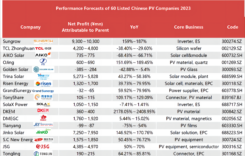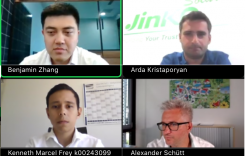PVTIME – CHINT Solar, a leading and fully integrated solar company with upstream module manufacturing capabilities and downstream project development & EPC capabilities, has won an award in the ‘Sustainable land management’ category at UNIDO Global Call for Innovative Solutions in Cleantech and Sustainable Land Management. The jury evaluated that the CHINT 310MW desert photovoltaic power station in Kubuqi, which mainly focuses on solar power generation, has avoided secondary desertification. At the same time, combined with the sustainable management strategy of agricultural planning and ecological management, it has global promotion and application value; Creatively combine the five governance issues of desert, grassland, solar energy, crop planting and poverty reduction, follow the principles of ecological environment governance, propose solutions according to local conditions, and create local employment opportunities through the application of sustainable technology for land / soil governance.
In July 2021, the United Nations Industrial Development Organization (UNIDO), the United Nations Convention to combat desertification (UNCCD) and the United Nations Framework Convention on climate change (UNFCCC), together with FCA, a leading German think tank, were organized to explore and promote innovative technologies and programmes to deal with climate change and promote inclusive, resilient and sustainable economic development Jointly launched the global collection of UNIDO Global Call 2021 for Innovative Solutions in Cleantech and Sustainable Land Management..
Since the official launch of the solicitation, 294 applications have been received from 71 countries on 5 continents. After the evaluation of the judges, four individual champions covering four categories finally stood out from 23 nominated projects.
CHINT 310MW desert photovoltaic power station in Kubuqi, Inner Mongolia was jointly invested by CHINT Solar and Elion Resources Group. The project was started at the historical background of desertification control in China. The Kubuqi project is the first solar desert project in China and is recognized as a landmark project for realizing renewable energy projects in such challenging environment.
Unique concept
CHINT Solar created a new model featuring sand control, farmland cultivation, husbandry, power generation and poverty alleviation. The area of afforestation and sand stabilization is amongst other planted with forage grasses which are resistant to cold, drought, salt and alkali. The drip irrigation under plastic film, the infiltrating irrigation, and other water-saving equipment and technology led to a survival rate of vegetation above 90% and resulted in desertification control and obvious greening effects. The model can now be replicated all over the world.
Besides producing around 14 billion kWh over the 25-year operation period and reducing the CO2 emission by more than 7 million tonnes, 3.000 jobs were created during construction. The project will continue to promote the economic development of the residents around the project site over the project lifetime. The Kubuqi project is a good example that commercial interests can be combined with social and ecological responsibility.
Catalyst for future solar energy projects
Chuan Lu, the chairman of the board and CEO of Zhejiang Chint New Energy Development Co., Ltd, reacts: “It is honoured that CHINT Solar has won the award for such an innovation project. With the waste and sandy land rented from farmers and herdsmen, we adopted remarkable sand control method while building the Solar PV project’s foundation. It has become the benchmark and demonstration desert Solar project in China. With the 310MW Kubuqi solar desert project,- CHINT Solar was able to proof that power generation can be successfully combined with social and ecological responsibility. Such landmark projects will further improve the acceptance of solar around the world and will motivate policy makers to introduce subsidy schemes for such holistic projects.”












